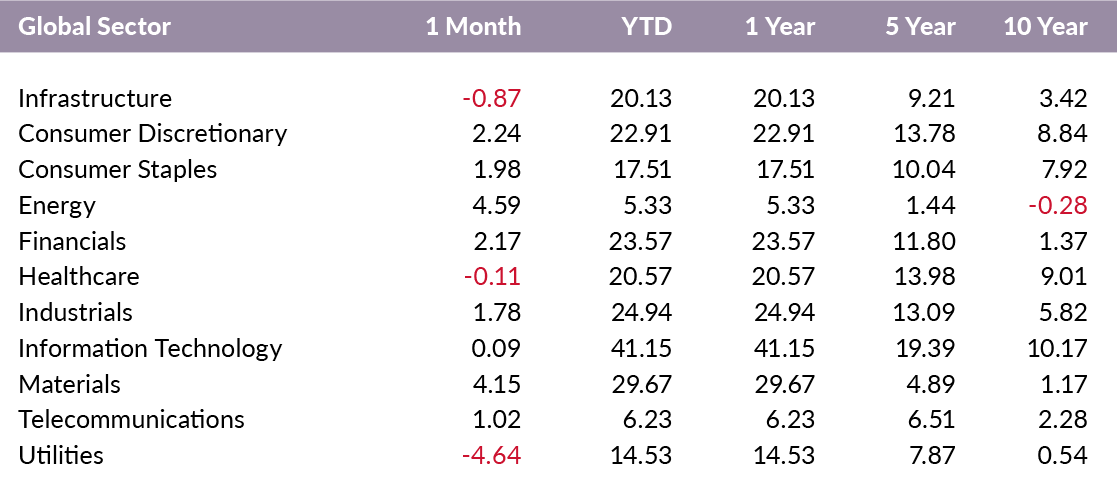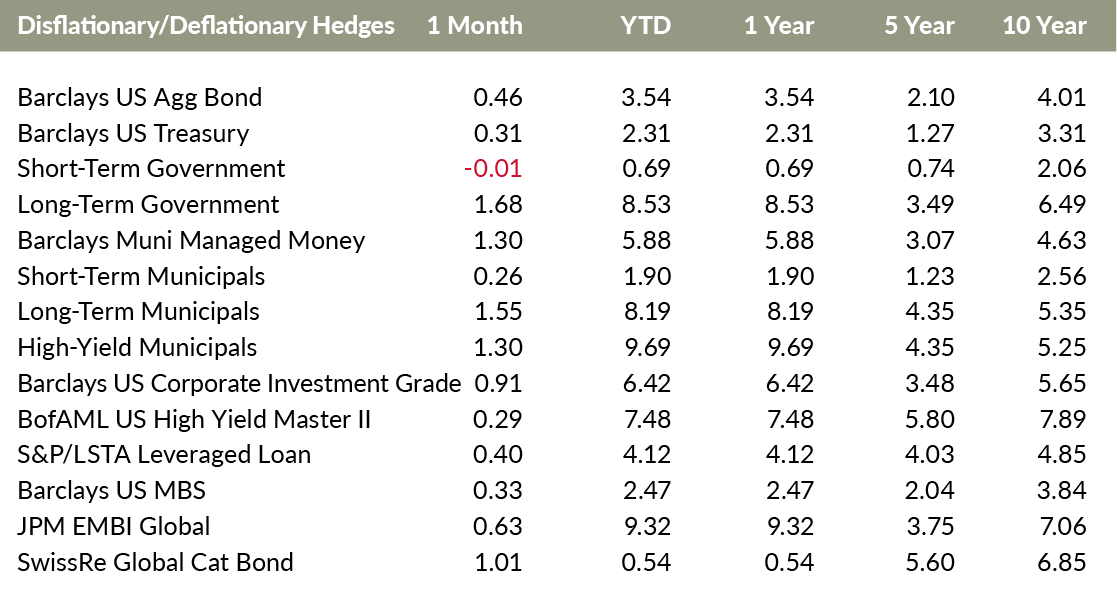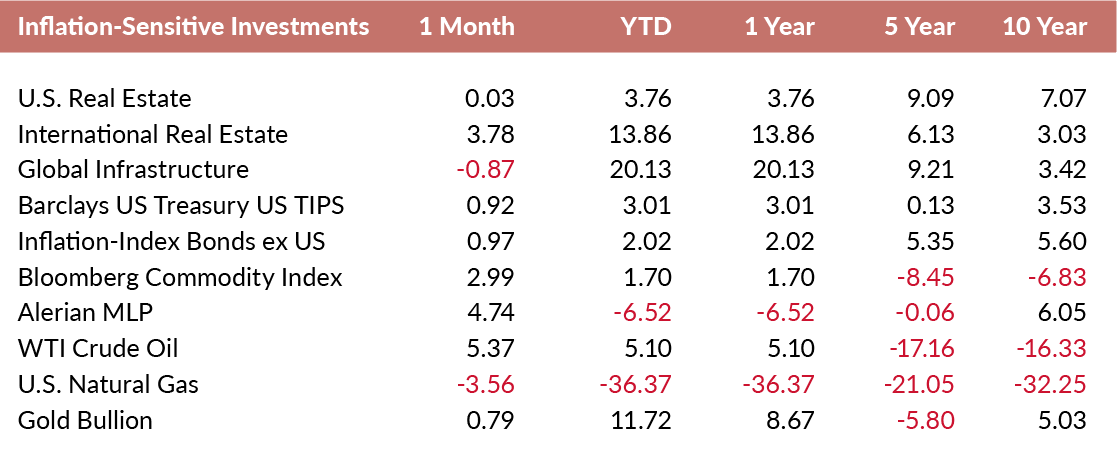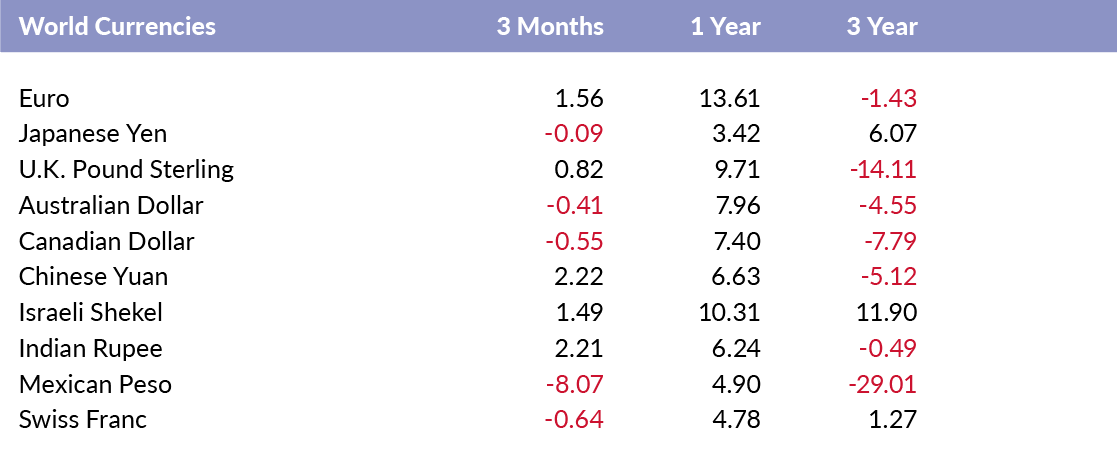Prepared by Brandon Yee and Thomas Connelly
 Commentary
Commentary
International Equities Outperform in 2017– In 2017, developed markets recorded strong returns. Europe ex UK and Pacific ex Japan had the strongest 2017 returns of 26.82% and 25.88%, respectively. The U.S. market lagged most other developed markets, but still posted a gain of 21.19%. Heading into 2018, the U.S market still trades at a valuation premium relative to international developed markets. Investors may benefit from a globally diversified portfolio.
 Commentary
Commentary
Emerging Markets Deliver Sizable Returns – The broader emerging markets recorded a sizable return of 32.08% in 2017. This return represents approximately 8% and 11% of outperformance relative to international developed markets and the U.S. market, respectively. Asian emerging markets posted the strongest equity returns with China and South Korea returning 54.07% and 47.30%, respectively. Future expected returns for emerging markets look relatively bright. Emerging markets trade at a steep discount relative to the U.S. market.
 Commentary
Commentary
Information Technology Drives Equity Markets– In 2017, information technology and materials posted the strongest global sector returns of 41.15% and 29.67%, respectively. Energy, telecommunications and utilities lagged other sectors. Information technology drove much of the market’s performance in 2017, but investors should not expect similar performance in 2018. The business cycle is in its later stages, and the current bull market is close to becoming the second longest bull market in history.
 Commentary
Commentary
Growth Outperforms Value in 2017– 2017 was the year for U.S. growth stocks. In the large cap space, growth’s outperformance over value was approximately 17%. In the small cap space, the relative outperformance was approximately 14%. The five and ten year annualized returns show a more modest picture of growth’s outperformance. However, investors with longer time horizons should still expect a value premium as history has shown.
 Commentary
Commentary
Foreign Small-Cap Companies Have Strong Year– In 2017, growth outperformed value in the large and small cap space. The size premium was approximately 2%. Over the past ten years, value and growth have performed similarly. As with the U.S. market, investors should still expect to receive a value premium over the long term for taking on the additional risk.
 Commentary
Commentary
Money Market Yields Remain Low– Both money market funds and T-Bills returned less than a percent in 2017. Through November, the CPI increased by 1.96% YTD. Investors may expect to see higher money market yields as the Fed continues to slowly raise rates.
 Commentary
Commentary
Deflationary Hedges Positive for the Year – The returns of deflationary hedges were all positive in 2017. Investors were rewarded for taking on credit risk and interest rate risk. High-yield municipals and emerging market bonds recorded the strongest returns of 9.69% and 9.32%, respectively. Short-term government bonds and catastrophe bonds were flat in 2017. With the Fed, ECB, and Bank of England all tightening, traditional fixed income may face more headwinds in 2018 compared to 2017.
 Commentary
Commentary
Gold Records Modest Gain– Inflation-sensitive investment returns were mostly positive in 2017. Infrastructure and international real estate posted strong gains of 20.13% and 13.86%. Natural gas and the Alerian MLP were down for the year. Since investors are extrapolating the current modest levels of inflation going forward, inflation-sensitive assets may prove useful in 2018 if unexpected inflation appears.
 Commentary
Commentary
U.S. Dollar Depreciates Against Other Major Currencies– Over the past year, the U.S. Dollar depreciated against most other major currencies. The Euro and Israeli Shekel gained the most ground. The Pound and Australian Dollar also had modest appreciation against the U.S. Dollar.
[mk_fancy_text color=”#444444″ highlight_color=”#ffffff” highlight_opacity=”0.0″ size=”14″ line_height=”21″ font_weight=”inhert” margin_top=”0″ margin_bottom=”14″ font_family=”none” align=”left”]Disclosure: Please remember that past performance may not be indicative of future results. Different types of investments involve varying degrees of risk, and there can be no assurance that the future performance of any specific investment, investment strategy, or product (including the investments and/or investment strategies recommended or undertaken by Versant Capital Management, Inc.), or any non-investment related content, made reference to directly or indirectly in this newsletter will be profitable, equal any corresponding indicated historical performance level(s), be suitable for your portfolio or individual situation, or prove successful. Due to various factors, including changing market conditions and/or applicable laws, the content may no longer be reflective of current opinions or positions. Moreover, you should not assume that any discussion or information contained in this newsletter serves as the receipt of, or as a substitute for, personalized investment advice from Versant Capital Management, Inc. To the extent that a reader has any questions regarding the applicability of any specific issue discussed above to his/her individual situation, he/she is encouraged to consult with the professional advisor of his/her choosing. Versant Capital Management, Inc. is neither a law firm nor a certified public accounting firm and no portion of the newsletter content should be construed as legal or accounting advice. If you are a Versant Capital Management, Inc. client, please remember to contact Versant Capital Management, Inc., in writing, if there are any changes in your personal/financial situation or investment objectives for the purpose of reviewing/evaluating/revising our previous recommendations and/or services. A copy of the Versant Capital Management, Inc.’s current written disclosure statement discussing our advisory services and fees is available upon request[/mk_fancy_text]
